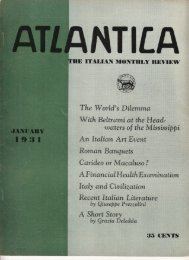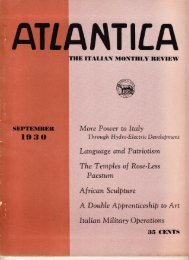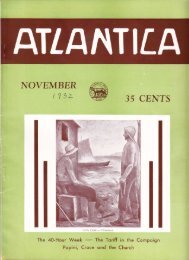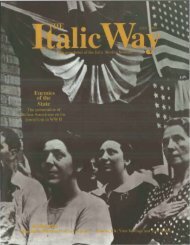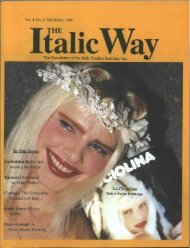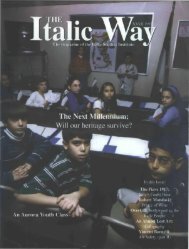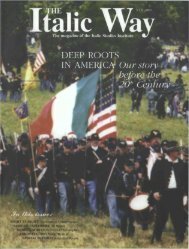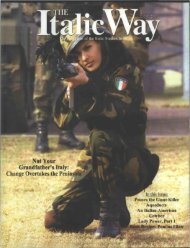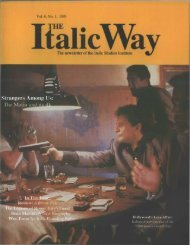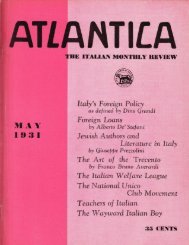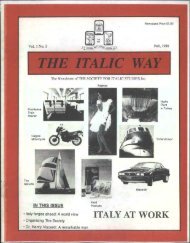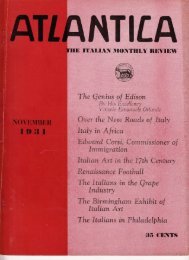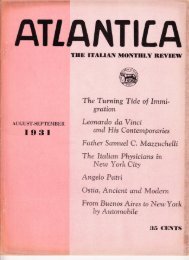L
Atlantica June 1931 - Italic Institute of America
Atlantica June 1931 - Italic Institute of America
- No tags were found...
Create successful ePaper yourself
Turn your PDF publications into a flip-book with our unique Google optimized e-Paper software.
B ooks In ReviewTHE MODERN ITALIAN NO'I/EL,h_,- Domeni"co Vittorini, Ph.D. WithBibliographical Notes and Ind,er. 296fages. Philadelpltia: Uni'",ersity ofPennsylvania Press. $3.f T u-as the purposc of Dr. \'it-I torini in u'riting "The i\IodernItalian Novel" to "introduce to the-\merican public the truiy significantpart of modern and contemporaryItalian fiction." A considerableportion of this Americanpublic r,r'hich he had in mind shouldbe those r.vho have become thoroughlyAmerican. yet who are ofItalian descent. Reading this booku.ill acquaint them'with the storednptreasures of Italian literature ofthe past century, something knownto their parents, but not to themselves.Critical, sympathetic and imaginative,Dr. Vittorini's prose disp1a1'ss penetrating knowledge ofthe ideas he discusses as well asthe subject matter itself. The authoris. Assistant Prolessor ofRomance fanguages and Literatureat the University of Pennsylvania,and his masterl' of both theItalian and the English languagesis adm,irable, and of no srnall importancein a work of this kind.Going back to, and beginningluith Manzoni's "f Promessi Sposi"(The Betr,othed), which the authorlakes as the beginning of modernItalian fiction, he outlines the threesuccessive stages of literary development:"historical realism."rn'hich reacted against the preceding"court" literature; the "naturalism"of Verga and Fogazzaro,f ollowed by the estheticism ofd'Annunzio and his followers: andfinally the present-day "'intellectual"and "introspectirre" work ofPirandello, Svevo, Borghese, Panziniand others.In his conclusion, Dr. Vittorinibelieves "l\'e are .n,itnessing in present-da1,Italy a nert classicism, n'otin the sense of a return to theu'orship of the ancients, but in theliving and universal meaning of theword," and he cites men and theirworks in support of his belief. Andin his closing lvords, he pays a tributeto Pirandello: "In the productionof todal' 35 a whole, however,Luigi Pirandello still towers abovehis contemporaries, and the traitsof his introspective, intellectualand tormented art 'dominate thesignificant works of contemporaryTtalian fiction."Dr. Vittorini, born in the Abruzzi,in ltaly, studied at the Universityof Rome, rvhere he receivedhis Ph. D. in 1916. Then he came tothe United States and took a postgraduatecourse at Frinceton University,where he earned hisAmerican degree of M.A. For trvoyears he taught Romance languagesat Temple University inPhiladelphia, and in 1919 he wastransf erred to the University ofPennsylvania in the same citl',n-here he has been since.A,IADAME BOf ARY, by Gustat,eFIaTIbert. LEATES OF GRASS, b!Watt Whitman ; CON FESSION S' OilS'l:" AUGUSTINE: CANDIDE, byV oltaire ; WUTH ERING HEIGHTS,by Emi,ly Bronte. Uniztersal Library.Neu Y orb: Gros.tet €r Dunlaf . $leach.T-\ HE crj is often raised in theseI days oF overproduction in thepublishing field that time-testedmasterpieces and classics are beingneglected in favor of the horde oflight, cheap novels that sell entirelyon the sensational appeal of theirhighly colored jackets. One of thcmost effective \\'ays of combatingthis tendency on the part of thepublishers, is. of course, to put outattractive, low-priced editions ofthese cla'ssics. In the "UniversalLibnary," Grosset & Dunlap aredoing just that."Madame Bovarlt" is probabl)'the best-known work of the greatFrench novelist, Flaubert, whotook infinite pains to make hisevery sentencer even every word,as perfect as he could. The resultwas that it took him years to rn''ritea novel. The lovely, sensuouswoman in this novel does nc.rt findhappiness in rnarriage, so she seeksit elsewhere, descending, in theprocess, step by step down the ladderto vice, crime and tragedy."Leaves of Grass" is one of theepics of American literature,known abroad as well as it is here.Walt Whitman was a man at leastfifty years ahead of his time, as iswitnessed by the fact that when thebook first came out it was mosthighly praised and at the same timemost heartil)'damned. To some hell'as a lunatic; to others he w'ascomparable to Confucius and Socrates.While nei'ther side mayhave been correct, undoubtedly"Leaves of Grass" marks a literarymilestone.In the "Conf essions," St. Augustinehas recorded his desperateattempts to regain possession of his?73soul, which, after a career as profligate,idolator, and voluptuarv, hefinally achieves through his conversionto the Church, later becomingone of its outstandingFathers.People r,vho believe that this isthe "best of all possible rvorlds"and that evelything happens forthe best had better not read"Candide," in which this naiveh'optinristic philosophy is cuttingli'satirized in Voltaire's most mordant$,ay. Yet even aside from itsv"orth beneath the surface, thebook is to be recommended for itshighlv entertaining story."Wuthering Heights" is a boolithat puzzles, bewilders and amazesby its spectacle of terror and pity.The power, fire and spirit ofEmily Bronte's genius infuses thisstory ef the wiid moors of northernEngland, a story of unbriclledpassions and violent aversions,over r.vhich broods "a horror ofgreat darkness."TT/ H ERE D EXI OC RACY TRI U M P HS,by F. PauI Miceli. 263 pooes. Pu,blishedby the u11h6y, \-ei Lottdon,Conn. S3.F OR the ltalians in the UnitedI' States. the subject of this book-the triumph ,of an Italian youthover the obstacles of a new and notaltogether friendly environnrent--is all-impor,tant. But more significanteven than its subject is thefact hat it was written by a youngItalian u'ho has been 'through itail himself. I,t constitutes one ofthe very few examples of theItalian contribution to presentdayAmerican letters.Like thousands of other Italianfamilies, Antonio di Lucca's hademigrated to America, the fatherpreceding the others. In his nervhome, Antonio goes through theexperiences that have been encounteredby countless other Italianboys: knon'ledge learned of thestreets, ideals struggling to overcromeugly realities,' misunderst'andingsat home, his feeling thathe is neither compietely alrAmerican or an Italian. etc. Bulthe desire for education is strongu,ithin him, and, being a naturalll.'bright young man. he manages toprogress. The climax of his successcomes when he u'ins first prizefor an essay trn the relation ofchemistry to disease. which enableshim to start at Harvard. u'here u-eleave him ambitioush- lookinq



